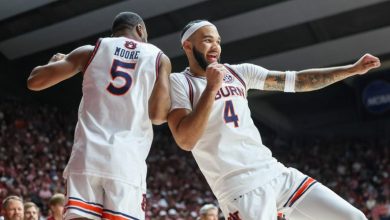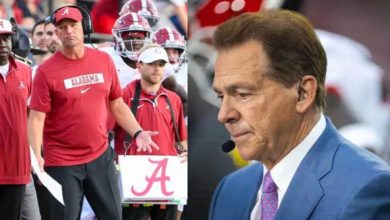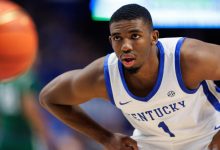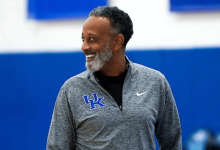Former Vol commit Brandon Anderson officially announces his commitment to Missouri, shifting his college football plans for 2026.
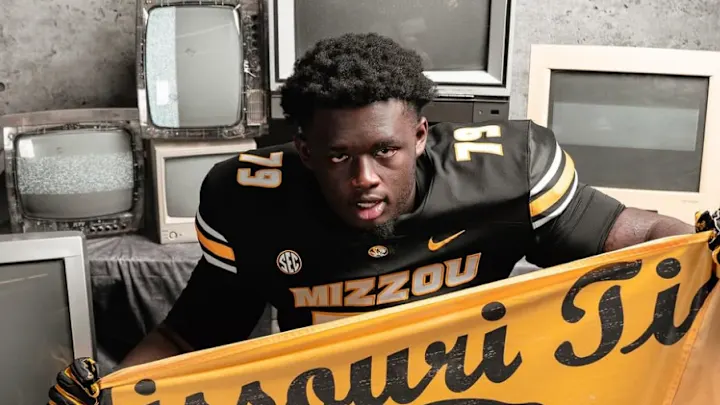
Recruiting in college football is a constantly evolving landscape, full of unexpected twists and turns. One recent development that has caught the attention of fans and analysts alike is the announcement by Brandon Anderson, a highly touted defensive prospect who initially committed to the Tennessee Volunteers, that he is now officially pledging his college football future to the Missouri Tigers for the 2026 season. This change of plans marks a significant moment not only for Anderson but also for both programs involved.
Who is Brandon Anderson?
Brandon Anderson is a talented defensive player from the 2026 recruiting class, known for his size, athleticism, and ability to disrupt opposing offenses. Originally committing to the Tennessee Volunteers, Anderson was considered a strong addition to their defensive recruiting haul. As a former Tennessee commit, his flip to Missouri has raised eyebrows and invited discussions around what factors influenced his decision.
Coming out of high school, Anderson is rated as a 3-star recruit by major scouting services. His strengths include physicality in run defense, solid tackling technique, and the versatility to play multiple roles on the defensive side of the ball. Coaches admire his work ethic and competitive spirit, traits that bode well for his development at the collegiate level.
The Initial Commitment to Tennessee
When Anderson first announced his commitment to Tennessee, it was seen as a promising acquisition for the Volunteers. Tennessee, competing in the highly competitive Southeastern Conference (SEC), has placed strong emphasis on strengthening its defense in recent recruiting cycles. Anderson’s pledge was a part of that broader strategy to shore up the defensive front and secondary, adding depth and talent to the roster for future seasons.
The Volunteers’ staff, led by head coach Josh Heupel and defensive coordinator Tim Banks, expressed excitement about Anderson’s abilities and potential fit in their defensive schemes. His commitment was welcomed by fans who saw him as a player who could develop into a valuable contributor on the field.
The Flip to Missouri
However, in a surprising turn, Brandon Anderson has now officially flipped his commitment from Tennessee to the University of Missouri. This announcement came as a shock to some fans but reflects the dynamic nature of college football recruiting, where prospects often reassess their options based on a variety of factors.
Missouri, also an SEC member, offers Anderson a unique opportunity to join a program with its own set of strengths and ambitions. Under the leadership of head coach Eliah Drinkwitz, the Tigers have been steadily improving and competing to establish themselves as contenders within the conference. Anderson’s addition is expected to bolster their defensive ranks and provide a boost to their recruiting momentum.
Factors Influencing Anderson’s Decision
Several elements may have contributed to Anderson’s decision to change his commitment from Tennessee to Missouri:
-
Playing Time Opportunities: Missouri may have presented a clearer path for Anderson to earn early playing time, a crucial factor for many recruits eager to contribute as freshmen.
-
Defensive Scheme Fit: The Tigers’ defensive style and scheme might align more closely with Anderson’s strengths and preferences, offering a better platform for him to showcase and develop his skills.
-
Relationship with Coaching Staff: Personal connections with Missouri’s coaching staff and recruiters can greatly influence a recruit’s decision. Anderson might have developed a strong rapport with the Tigers’ coaches, feeling confident in their ability to mentor him.
-
Program Trajectory: Missouri’s recent performance and future outlook could have appealed to Anderson’s vision for his college career, especially if he sees an opportunity to be part of a rising program.
-
Geographic and Academic Considerations: Proximity to home and academic offerings are also important to many recruits and their families. Missouri may provide advantages in these areas compared to Tennessee.
Impact on Tennessee Volunteers
Anderson’s decision to flip commitments is undoubtedly a setback for Tennessee’s 2026 recruiting class. Losing a defensive prospect of his caliber creates a gap that the coaching staff will need to address by targeting other players to maintain the class’s overall balance and competitiveness.
For the Volunteers, this moment underscores the challenges of recruiting within the SEC, where programs frequently compete for the same pool of talent. It also highlights the importance of continuous relationship-building and adaptability throughout the recruiting process.
Despite the loss, Tennessee remains committed to assembling a strong class and has shown resilience in recruiting battles in previous years. The coaching staff will likely ramp up efforts to secure other defensive recruits to fill the void left by Anderson.
Missouri Tigers Gain Defensive Boost
For Missouri, landing Brandon Anderson is a significant recruiting victory. It demonstrates the Tigers’ growing appeal and ability to attract quality players within a competitive conference landscape.
Anderson’s skill set adds valuable depth and versatility to Missouri’s defense. His ability to contribute in multiple roles enhances the Tigers’ flexibility in designing defensive packages and adapting to diverse offensive threats.
This commitment also signals to other recruits that Missouri is a viable destination for talented prospects looking to develop and compete at a high level in the SEC.
The Bigger Picture: Recruiting Dynamics in College Football
Anderson’s flip from Tennessee to Missouri highlights broader trends and realities in college football recruiting:
-
Fluidity of Commitments: Verbal commitments are non-binding, and changes in recruitment happen frequently. Coaches and fans must stay prepared for shifts in recruiting landscapes.
-
Importance of Fit: Players and their families seek programs where they believe they will thrive both on and off the field. This includes scheme compatibility, coaching relationships, and academic support.
-
Competition Within Conferences: The SEC is known for intense recruiting battles, with multiple programs vying for top prospects. This environment fuels uncertainty and requires programs to be proactive and persistent.
-
Recruit Development: Recruiting rankings, while important, are just one piece of the puzzle. How a player develops within a program can far outweigh initial star ratings.
What’s Next for Brandon Anderson?
As Anderson prepares to join Missouri’s football program, the focus will shift to his transition from high school to college football. He will have access to Missouri’s coaching expertise, strength and conditioning programs, and facilities designed to maximize athlete development.
His success will depend on his ability to adapt to the faster pace and complexity of college football, learn the Tigers’ defensive schemes, and continue improving his technique and physical skills.
For Anderson, this new chapter offers a fresh start and the chance to make a meaningful impact on a team with rising ambitions in the SEC.
What This Means for Fans
For Tennessee Volunteers fans, Anderson’s decision is disappointing but part of the unpredictable nature of recruiting. It serves as a reminder of the challenges coaches face and the importance of supporting the program as it navigates the ups and downs of building a winning team.
Missouri Tigers fans, on the other hand, have reason to be optimistic. Securing a recruit like Anderson provides excitement and hope for the future, adding a talented piece to the defensive puzzle.
Both fanbases will be watching closely to see how Anderson develops and contributes in the seasons ahead.
Brandon Anderson’s commitment flip from Tennessee to Missouri is a noteworthy development in the 2026 recruiting cycle. It highlights the complex, competitive nature of college football recruiting, especially within the SEC.
While Tennessee faces the task of adjusting its recruiting strategy to fill the gap left by Anderson, Missouri gains a promising defensive talent who could play a pivotal role in their quest for SEC relevance.
As college football continues to evolve, stories like Anderson’s remind us that recruiting is a dynamic process shaped by relationships, opportunities, and strategic decisions. Ultimately, the success of both player and program will depend on how they capitalize on this new partnership in the years to come.




